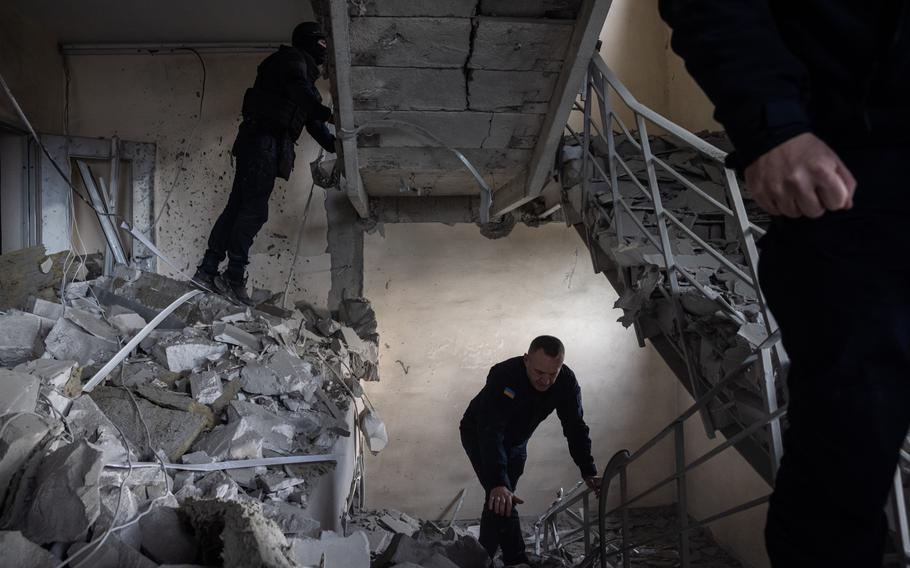
Emergency workers go through a damaged residential building in Kharkiv’s city center on Tuesday. (Ed Ram for The Washington Post)
KYIV — Ukrainian President Volodymyr Zelenskyy on Wednesday scrapped a planned trip to Spain in order to stay in his capital and address Russia’s expanding front-line assault, his spokesman said, a measure of the rapidly increasing anxieties over the Kremlin’s military advances in recent days.
The decision came as Secretary of State Antony Blinken announced another $2 billion in U.S. military aid as he wrapped a two-day visit to Ukraine that was intended to demonstrate Washington’s continued support for the war-hit country.
Blinken’s trip was planned before Russia’s weekend advances on Ukraine’s second-largest city, Kharkiv. But it also served to highlight the lingering consequences of Washington’s seven-month delay in approving more military aid for Ukraine. Stocks of artillery shells and other long-range munitions have run perilously low, leaving Ukrainian troops on the back foot.
“Every delay of supply results in setbacks on the front line. This is the general rule,” Ukrainian Foreign Minister Dmytro Kuleba told reporters Wednesday, speaking alongside Blinken after the two met each other. “When a Ukrainian infantryman or artilleryman has everything that he or she needs, we are winning,” he said. “Every time there are delays in supplies and insufficient supplies, we are not winning. The law of war is cruel but very clear.”
The aid announced by Blinken — in the form of new weapons systems and support for Ukraine’s defense industry — comes partially from a $61 billion package that Congress approved last month, while $400 million of it comes from a separate pool of money earmarked for general foreign defense aid now being directed to Ukraine.
But even as he announced the new assistance, Blinken said that the Biden administration remained opposed to allowing Ukraine to strike targets inside Russian territory with U.S. weaponry — something Ukrainian policymakers have been pushing for with increasing urgency. Russia in recent days has mounted an assault on towns near Kharkiv, which is 25 miles from the border and being hit by weaponry launched from Russian territory.
“We have not encouraged or enabled strikes outside of Ukraine,” Blinken told reporters Wednesday at the end of his visit to Ukraine, his first since September. “But ultimately, Ukraine has to make decisions for itself about how it’s going to conduct this war, a war it is conducting in defense of its freedom, of its sovereignty, of its territorial integrity,” he said.
Standing alongside Kuleba, Blinken added, “And we will continue to back Ukraine with the equipment it needs to succeed.”
Zelenskyy had been scheduled to visit Spain later this week to sign a bilateral security agreement with Prime Minister Pedro Sánchez. Portuguese media reported that he had also been expected in their country.
Zelenskyy “has instructed that all international events involving him scheduled for the coming days be postponed and new dates coordinated,” his spokesman, Serhiy Nykyforov, wrote on Facebook. “We are grateful to our partners for their understanding.”
Ukraine has used weaponry supplied by other countries, including Britain, to hit targets on Russian soil, but Blinken indicated no policy change on the part of the United States. The White House has forbidden American equipment from being used to hit Russian territory for fear of inciting a direct military conflict with Moscow, which holds the world’s largest arsenal of nuclear weapons.
That has proved frustrating for Ukraine, especially in recent weeks, as it witnessed a military buildup on Russian territory close to Kharkiv but was severely limited in its ability to strike it.
Analysts and U.S. officials say Russian forces do not appear poised to capture Kharkiv city, but that they are probably trying to cause enough of a challenge there to draw Ukrainian military assets away from other front-line positions.
The Institute for the Study of War, a Washington-based independent research group, said Russia’s attack on the northeast Kharkiv region appeared to have slowed, indicating that it was probably an effort to create a buffer zone on the border, not an effort to capture the city. The group said Russia continued to make small but steady gains farther south.
The Kremlin on Wednesday appeared to be battling for control of Robotyne, a previously Russian-occupied village in the Zaporizhzhia region. The village has symbolic importance as it was one of the few places liberated by Ukrainian forces during a largely unsuccessful counteroffensive last summer. Local Ukrainian authorities disputed a Russian claim that Moscow had once again seized the village, but they acknowledged that a fierce assault was underway.
Blinken said the $2 billion for Ukraine would come in the form of a “first-of-its-kind defense enterprise fund” that would channel assistance to the country in the coming months.
The top U.S. diplomat ended his visit to Ukraine on Wednesday with a visit to companies that are manufacturing drones and prostheses, two examples of what U.S. officials said were examples of Ukrainian economic ingenuity that can help rebuild the country’s economy. Walking alongside Kuleba through central Kyiv, Blinken also laid wreaths along a memorial wall dedicated to
Ukrainian soldiers who had been killed in the fighting with Russia.
Despite the promises of U.S. support, Ukraine’s immediate needs are growing larger and more noticeable. Electricity on Tuesday and Wednesday nights was cut to large parts of Kyiv because of shortages stemming from Russian attacks on energy infrastructure, a foreboding sign for the coming months.
Kuleba, speaking to reporters after the walk with Blinken, said he had pushed the U.S. secretary of state on Ukraine’s urgent defense needs. Zelenskyy on Tuesday asked Blinken for two Patriot antiaircraft batteries immediately to help defend Kharkiv.
“We looked at the entire inventory that can be accessible, that can be brought to Ukraine,” Kuleba said. The two Patriot batteries for Kharkiv “were necessary yesterday,” he said.
“I am glad that we are approaching to the achievement of this goal, but we should speed up this effort,” he said. Anastacia Galouchka contributed to this report.